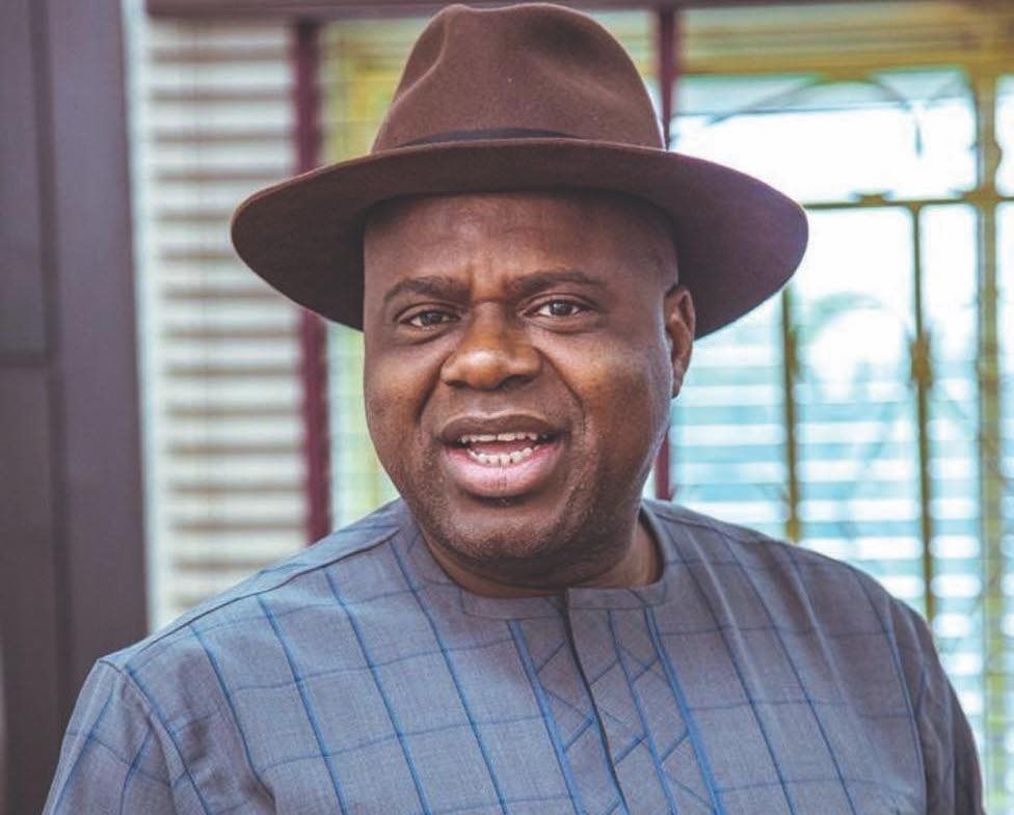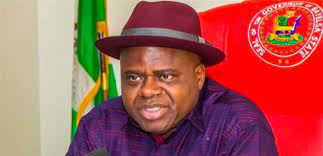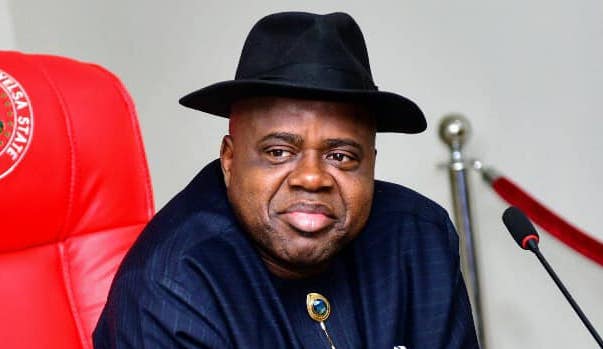NEWS
Bayelsa Urges Labour Unions to Shelve Planned Strike

From Tayese Mike, Yenagoa
The Bayelsa Government has appealed to labour unions in the state-owned tertiary institutions not to embark on their planned strike, saying efforts were underway to address their demands.
State Deputy Governor, Lawrence Ewhrudjakpo, made the appeal on Tuesday, at a meeting with the representatives of the various unions under the aegis of the Higher Institutions Joint Action Committee (HIJAC) in Government House, Yenagoa.
Ewhrudjakpo pointed out that since the committee set up by the government to look into their demands had not completed its assignment, it would not be necessary for the unions to commence strike.
He noted that the industrial action would not only adversely affect the education system of the state, but also a disservice to members of the unions if they go ahead to down tools at a time frantic efforts were being made to address their grievances.
According to the deputy governor, government had already agreed to implement the new Minimum Wage for workers in the state tertiary institutions.
He, therefore, assured the labour leaders that the implementation would commence as soon as the right figures and computations were made available by the committee handling the assignment.
Ewhrudjakpo equally promised that the state government would introduce a new template for paying annual subventions to the tertiary institutions.
“I want to appeal to you to shelve your planned strike. You need to tell your people there are procedures to take for striking.
“I want you to explain to your members there is still collective bargaining and we are at the verge of resolving the issues.
“We have not declared that our talks had broken down; if they had broken down, you would know as enlightened people.
“Tell them they should not go on strike because it will not help us. The harm strikes have done to our society far outweighs any benefit one may get from it.
“We will take the minimum wage implementation first before the promotion arrears. The implementation must be across board and the unions should be fully involved in the implementation process.
“From our deliberations here, government has agreed in principle to implement the new minimum wage for your members in the state owned tertiary institutions which have not benefited from the implementation.
“However, a committee has been set up to get the appropriate salary structure from the polytechnics in our neighbouring states. As it stands now, the polytechnics salary structure is not available,” he said.
Earlier in his address, the Chairman of HIJAC, Mr Gbenizibe Amachree, listed the unions` demands to include implementation of the new minimum wage, re-instatement of their wrongfully disengaged members, implementation of promotions and payment of promotion arrears to members.
The unions also called on the state government to separate subventions from salaries being paid to staff of tertiary institutions, insisting that such subventions should rather be channeled to infrastructural development of the schools.
Highpoint of the meeting was the setting up of some committees including the one chaired by the Chairman, Bayelsa State House of Assembly Committee on Labour Matters, Mr Ebiuwou Koku-Obiyai.
The committee, which is mandated to look into the alleged wrongful disengagement of workers, has the Permanent Secretary, General Services, Mr Anthony Ikhobo, as Secretary.
Members of the committee include the Commissioner for Education, Mr Gentle Emelah, his labour counterpart, Mr Stanley Braboke and members of HIJAC including Mr Wilcox Fakidoma, Mr Alex Toun-aregha and Mr Egisi Isaac.
All the committees are expected to submit their reports within two weeks to enable government study the recommendations with a view to implementing them expeditiously.
NEWS
Diri Campaigns Against Drug Abuse, Trafficking

From Mike Tayese, Yenagoa
Bayelsa State Governor, Sen. Douye Diri yesterday, led a campaign against drug abuse and illicit trafficking as part of activities commemorating the International Day Against Drug Abuse and Illicit Trafficking.
Diri advised people of the state, particularly the youths, to shun hard drugs and trafficking of illicit substances, saying they were harmful to their health and to the society.
The Bayelsa governor, who spoke shortly after the weekly Prosperity Walk exercise at the Samson Siasia Sports Complex in Yenagoa, also urged youths to develop themselves by acquiring a skill and work towards actualising their God-given potential.
“We just completed a nine to 10km walk, which is a test of our fitness. As it is said, health is wealth.
“Today is the International Day Against Drug Abuse and Illicit Trafficking. We are not only observing the global campaign, we are also leading it here in Bayelsa.
“No one in his right senses goes to commit crime and violent acts except that individuals are under the influence of hard drugs. My advice to youths is to be self-confident, have the fear of God and develop your innate potential for you to become a star.”
He implored youths to emulate the shining example of a Bayelsa-born United States-based athlete, Victory Godah, who was discovered through the state’s sports programmes.
He commended her gesture of donating sporting equipment as a way of giving back to the state.
“Victory Godah from Ekeremor local government area was discovered here and because of her skill, she is now at the University of Minnesota, United States. She has given back to the state through sports equipment so that more of us can have that access.”
In his remarks, the Commissioner for Health, Prof. Seiyefa Brisibe, emphasised the importance of the weekly walk, stating that participants above 40 years would have their blood pressure controlled after taking about 5,000 steps.
Also, state chairman of the Drug Abuse, Addiction, Prevention and Rehabilitation Committee, Dr Peter Owonaro, said the committee’s outreach in the state had been a huge success, noting that a recent research indicated that the drug abuse prevalence rate in Bayelsa dropped by five per cent from 21.4 per cent.
Also, the state commander of the National Drug Law Enforcement Agency (NDLEA), Kanu Sunny, lauded the state government for its unprecedented support in the fight against drug abuse and trafficking.
He said the campaign was taken to secondary schools as well as tertiary institutions and encouraged all to join in the war against the menace.
Foreign News
Ally of Cameroon President, 92, Quits ‘Broken’ Government to Challenge Him

Issa Tchiroma Bakary – a prominent minister and long-time ally of President Paul Biya – has quit Cameroon’s government, in the hope of ending 92-year-old Biya’s four-decade grip on power in upcoming elections.
Just four months before the central African nation went to the polls, Tchiroma said the Biya administration he belonged to had “broken” public trust and he was switching to a rival party.
“A country cannot exist in the service of one man,” he said on Wednesday.
While he was communications minister, Tchiroma notably came under fire for denying – then backtracking on his denial – that Cameroonian soldiers had killed women and children in a viral video.
His other roles during almost two decades in government include being a spokesman for the Biya government, and, until his resignation on Tuesday, he was employment minister.
Paul Biya – the world’s oldest head of state – has yet to confirm if he will attempt an eighth term as president. Last year, the country banned reports on the president’s health following rumours he had died.
As this election approaches, high unemployment and soaring living costs are of concern to many Cameroonians, as are corruption and security. A separatist insurgency in the English-speaking provinces as well as jihadists operating in the northernmost region have forced many thousands of Cameroonians from their homes in the past decade.
Cracks in Tchiroma’s relationship with President Biya were blown open earlier this month, when he told crowds in his home city of Garoua that Biya’s time in power had not benefited them in any way.
Tchiroma, widely reported to be 75, continued this criticism in a 24-page manifesto released a day after his resignation – promising to dismantle “the old system” so that Cameroon could move beyond “abuse, contempt, and the confiscation of power”.
One of his proposed solutions is federalism – he is offering to hold a referendum on devolving more power to Cameroon’s 10 provinces. This has long been mooted by many as a solution to the country’s so-called Anglophone crisis.
Specifically addressing English-speaking Cameroonians, who have long complained of marginalisation and discrimination in Francophone-dominated public institutions, he said “you do not need people to speak for you – you need to be listened to” and that “centralisation has failed”.
Tchiroma also used his manifesto to say Cameroon “has been ruled for decades by the same vision, the same system. This model, long presented as a safeguard of stability, has gradually stifled progress, paralysed our institutions, and broken the bond of trust between the state and its citizens”.
As the October presidential election approaches, rights groups have condemned the government’s crackdown on dissent.
Shortly after Tchiroma announced his plans to run for the presidency, the government reportedly announced a ban on all political activities by his Cameroon National Salvation Front (CNSF) party in a sub-district of the Far North region – a part of the country where he is said to be an influential power-broker.
Weeks earlier, fellow presidential hopeful Maurice Kamto had his movements curtailed during a two-day police stakeout in Douala, after promising supporters at a rally in Paris that he would protect Biya and his family if he wins in October.
Parliamentary elections that were also supposed to take place earlier this year have been delayed until 2026.
Reaction to Tchiroma’s presidential bid has been mixed – some think he is canny.
“By positioning himself as the elder statesman who ‘saw the fire coming’, Tchiroma is hedging that his break with Biya will be seen as bold – not opportunistic,” Cameroonian analyst and broadcaster Jules Domshe said.
“From economic fallout to youth unemployment, insecurity, and growing unrest in the North-West, South-West, and Far North [regions], Cameroon is ripe for change.”
Opposition voices are divided – some want Tchiroma to support Kamto, who was the runner-up in 2018 with 14% of votes. But others say he is tainted by his long association with Biya.
“He cannot embody change… He was part of the system for too long. The youth do not trust him,” says Abdoulaye Harissou, a legal notary and prominent critic once detained by the government.
Another member of the opposition – Jean Michel Nintcheu of the APC coalition – simply said: “We don’t see Tchiroma as a potential winner.”
| ReplyReply allForwardAdd reaction |
Foreign News
Crash Kills 29 Pupils Taking Exams after Blast in Central Africa

Torough David, Abuja
Twenty-nine children who were taking their school exams in the Central African Republic have been killed in a crash after a nearby explosion caused panic, a hospital director disclosed.
The blast, on the second day of the high-school finals on Wednesday, occurred at an electricity transformer, said Abel Assaye from the Bangui community hospital.
“The noise of the explosion, combined with smoke” caused alarm among the almost 6,000 students sitting the baccalaureate at a school in the capital, Bangui, local radio station Ndeke Luka reported.
President Faustin-Archange Touadéra has declared a period of national mourning.
He also ordered that the more than 280 who were wounded in the crash get free treatment in hospital.
Students from five different schools in the capital had gone to the Lycée Barthélémy Boganda to sit the baccalaureate exam.
The education ministry said the explosion happened after power was restored at the electricity transformer, located on the ground floor of the main building that had been undergoing repairs.
“I also offer our sincere condolences to the parents of the affected candidates and wish a speedy recovery to the injured candidates,” Education Minister Aurelien-Simplice Kongbelet-Zimgas said in a statement.
He also announced the suspension of further exams.
A female survivor said.
“I don’t even remember what happened. We were in the exam room and when I heard a noise, I immediately fell into a daze,” she said. “Since then, I have had a pain in my pelvis that is causing me a lot of problems.”
Radio France Internationale spoke to another student whose face was covered in blood after he had climbed out of a window.
Magloire explained that the blast happened during the history and geography exam.
“The students wanted to save their lives, and as they fled, they saw death because there were so many people and the door was really small. Not everyone could get out,” he told RFI.
The CAR continues to face political instability and security challenges.
Government forces, backed by Russian mercenaries, are battling armed groups threatening to overthrow Touadéra’s administration.




























